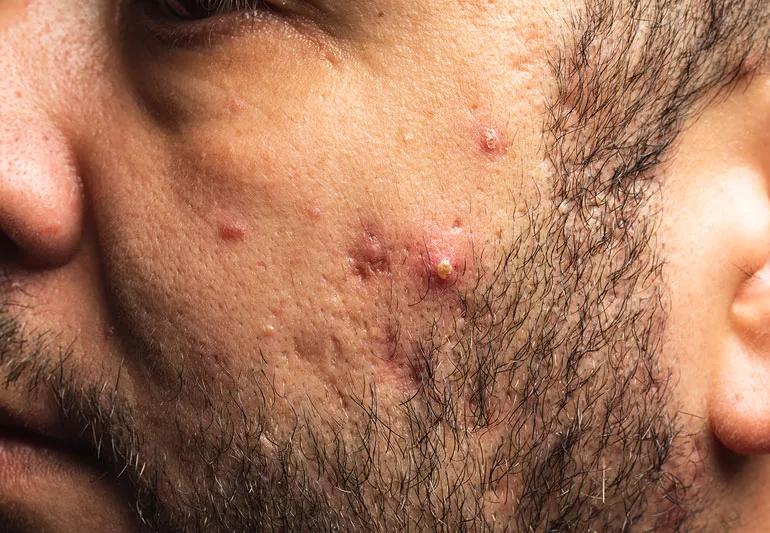Three reasons to seek help, plus effective treatment options

Image content: This image is available to view online.
View image online (https://assets.clevelandclinic.org/transform/1c5afe4b-69f0-4f8f-93c2-db34ce8d2c98/adultManAcne-1136462493-770x533-1_jpg)
man with acne
You’re long past the awkward middle school or high school puberty stage — maybe really long past. So why hasn’t your face gotten the memo?
Advertisement
Cleveland Clinic is a non-profit academic medical center. Advertising on our site helps support our mission. We do not endorse non-Cleveland Clinic products or services. Policy
“Acne is definitely normal for teenagers — more than 90% of teens get acne. The outliers are the ones who don’t get it in their teenage years,” says dermatologist Alok Vij, MD. “But we’ve definitely seen over the past few decades that people don’t grow out of acne as quickly as they used to.”
For men, acne can sometimes persist into your 20s and 30s. (Sorry, guys!)
But all is not lost! Learn when you should seek help from a dermatologist.
“Acne is primarily a hormone-driven process,” Dr. Vij explains.
“It’s the excess activity of the male hormones, like testosterone, at the level of the hair follicle and the oil gland that leads to excess oil production, blockage of the hair follicles and then inflammation from overgrowth of bacteria in the area,” he says.
This process is still the same in adult acne, it just lasting even longer.
Dr. Vij says there are a few reasons men should seek out help for acne:
Advertisement
“Some people who have had acne feel their experience is just as bad as if they have a chronic medical condition, or in some cases, even cancer. Their quality of life gets that bad. And because acne can be a scarring process, that negative effect on someone’s life can be a lifelong thing.”
Since acne is hormone-related, you can’t treat men who have breakouts the same way you do women. And vice versa.
In women, medications used to stabilize the level of hormones include birth control pills or a medicine called spironolactone, which basically blocks the effect of testosterone at the hair follicle.
“We don’t use those medications in men at all because — while you could put a man on birth control — he wouldn’t be happy about it,” Dr. Vij says.
What is used for men instead? There are three main strategies:
Lastly, Dr. Vij says it’s important to note that there are two common pitfalls that lead to worsened breakouts in men.
“Now, more and more skin care companies are marketing new products specifically for men. Women always, I think, know to look for makeup and facial care products that say ‘noncomedogenic’ or ‘not pore-clogging,’” he says. “Men don’t necessarily look for the same thing. If you’re going to buy a new product, make sure it says it’s noncomedogenic.”
Advertisement

Sign up for our Health Essentials emails for expert guidance on nutrition, fitness, sleep, skin care and more.
Learn more about our editorial process.
Advertisement
It’s best to avoid picking at zits, which can damage your skin (though there are ways to minimize the risk)
This medication only works well for short periods of time and when paired with other treatments
‘Zit stickers’ can help heal a new or popped pimple, but they’re limited when it comes to managing acne
Try exfoliating and using salicylic acid to treat this pesky skin care issue
Wear light, breathable clothing, shower after you exercise and change your sheets regularly
As you age, hormones can continue to play a big role in breakouts
Some remedies might help banish breakouts, but others are best avoided
Birth control pills with estrogen are best for fighting hormonal acne
Prioritize your health by managing stress, strengthening your social connections and getting quality sleep
Bolsters, blankets, pillows and blocks can offer extra support, stability and comfort
Allergies, postnasal drip, asthma or reflux could be to blame for a cough that won’t quit